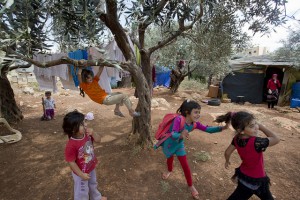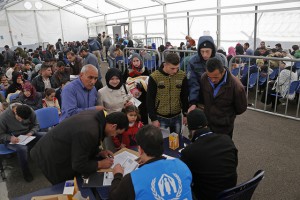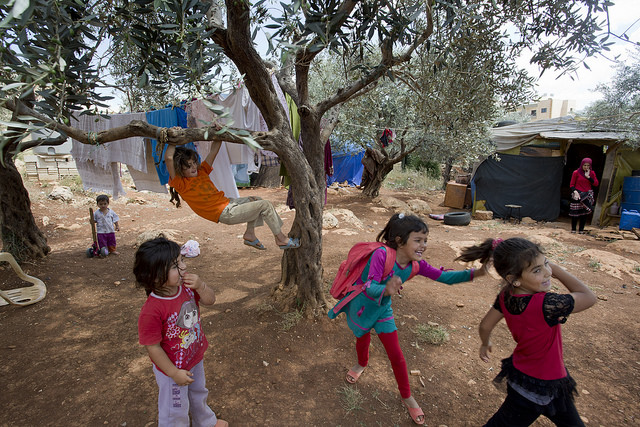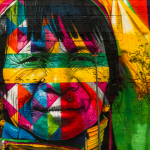It is almost 12:00 PM, I have been on the road from Sweden to Germany for over 9 hours, and that alone is reason enough to be exhausted. But this time I got to enjoy not only a 30-minute delay and continuous anxiety about missing my connecting train, but also a drunken musician as my seat neighbour, who refused to stop playing music on a night train and absolutely had to pay his 80 Euro ticket in coins.
But just as the train finally enters my rail destination a woman with a hijab approaches me, holding the hand of a little girl, her husband anxiously waits behind her with their second daughter. They are from Iraq and according to the badges around their neck should now be in a refugee home close to Hanover and not about a hundred kilometres south of it. In the next minutes we establish not only that the family took the wrong train and that there is no train back for them tonight, but also that their third child is in the refugee camp they cannot get to.
I realise how luxurious having one stressful day of traveling is in comparison. After many calls and a lot of discussion, she and her family are finally safe on the way to a closer refugee camp for the night. But this occurrence makes me think. How can such an organised country as Germany allow a family of four to get lost, without anyone to contact for information? What would their situation be like if they stayed in a Middle Eastern refugee camp? Would it be any better?
Working with countries in the Middle East to improve the situation for refugees and, ultimately, keeping refugees from coming to Europe is not a new plan. The sudden readiness of the EU to cooperate with Erdogan to decrease the influx of refugees shows the dedication of Western countries to solve the crisis close to its base, as far away from Europe´s borders as possible.
 But how realistic is this plan? When refugees in rich countries like Germany freeze in tents in late October and are missing shoes for the cold months in Sweden, how are poorer countries like Lebanon supposed to take care of the refugees from Syria and Iraq effectively?
But how realistic is this plan? When refugees in rich countries like Germany freeze in tents in late October and are missing shoes for the cold months in Sweden, how are poorer countries like Lebanon supposed to take care of the refugees from Syria and Iraq effectively?
Cassandra Carr is a Canadian student who worked with the Lebanese humanitarian organisation called Blue Mission. With first-hand experience working in a camp, Cassandra has answers to some of my questions.
The Organisation offers psychosocial support, primary health care services, and informal education as well as access to libraries in 18 Lebanese refugee camps.
When I think of these camps, I imagine stability, but this contradicts the common notion of squalid and unequipped tent cities in the worst cases.
Cassandra says that “the camps are not permanent or set up by any organisation, at least not the ones we were active in. They just popped up or disappeared ungoverned, often in abandoned or half destroyed buildings, or were just people gathering with their tents.” Most of the refugees Cassandra worked with are Syrians and the majority are women and children.
She continues by saying that “the situation is really bad. Obviously some camps are off worse than others, but just in general there are so many sick people. And while there were organisations offering primary health care and medicine distribution, access to doctors and nurses was sparse. Many people needed a lot more than primary health care, but could not afford going to a hospital or doctor, who would offer that.”
Poor sanitation and overfilled camps lead to growing sickness within them, and Cassandra tells me that sometimes as many as 30 families use one bathroom. But the poor medical care is not only due to a lack of resourced. Cultural differences also play a huge role: “Lebanon in general is a lot more liberal, when it comes to contact between men and women, so it was not immediately obvious that many Syrian refugee women were not seeking medical care, simply because we had a male doctor, while the idea of masculinity kept a lot of Syrian men from talking to a female counsellor.”
With struggles to fulfil the basic needs of refugees, integration is far off. For example many of the refugee children cannot even attend Lebanese schools due to  losing certificates and transcripts during their journey to Lebanon. Currently, Cassandra does not know of any programmes that can alleviate this issue and integrate refugees into Lebanese society.
losing certificates and transcripts during their journey to Lebanon. Currently, Cassandra does not know of any programmes that can alleviate this issue and integrate refugees into Lebanese society.
Additional historical context makes interaction between the Lebanese public and the refugees even more difficult. Syria occupied Lebanon from 1976 to 2005 during the Lebanese civil war. Many Lebanese feel that even letting Syrian refugees into their country is a huge breech of national unity and trust in the Lebanese government. These underlying regional conflicts are not rare in the Middle East and are only fuelled further by religious disputes between Shiites and Sunnites.
Another huge challenge is the lack of infrastructure and cooperation between humanitarian organisations. Many of the local organisations compete for funding and numbers. Cassandra points out that “there is a huge lack of communication and often numerous organisations offer the same services in the same camps. There is no common approach and no coordination. The funds are being cut so programmes are not only decreasing in quality, programmes focus more on competing with other humanitarian groups for money rather than on working together.” Cassandra sees that the ineffectiveness of humanitarian work in the region is due to the constant threat of conflict or even war. “There is no certainty for peace, for a still functioning system even the next day, so a lot of work that is done is very short-sighted.”
It may seem like a good approach on paper as the EU supports Syria and Iraq´s neighbouring countries to take in the flow of refugees they do not want, but a lot is ignored when planning these refugee camps and the allocation of resources.: The poor infrastructure and coordination, competition between humanitarian groups, ethnic tensions, and the lack of training and background-expertise of many aid workers create long-term problems that do not have a quick fix.
For many refugees living under these circumstances, Cassandra believes that staying is simply not an option. “If organisations could somehow stabilize refugees’ lives by creating long-term opportunities for work and study, and gave access to health care, I think refugees might want to stay long-term.”
However this is a long-term process as currently “refugees simply can´t sustain themselves in Lebanon”, making a further flight to Europe so much more attractive. If the European Union really wants to make their dream of keeping refugees within the Middle Eastern region, there is a lot to be done.
By Céline Sonnenberg
Image credit:
Picture 1&2: World Bank Photo Collection, Licensed under CC BY-NC-ND 2.0










